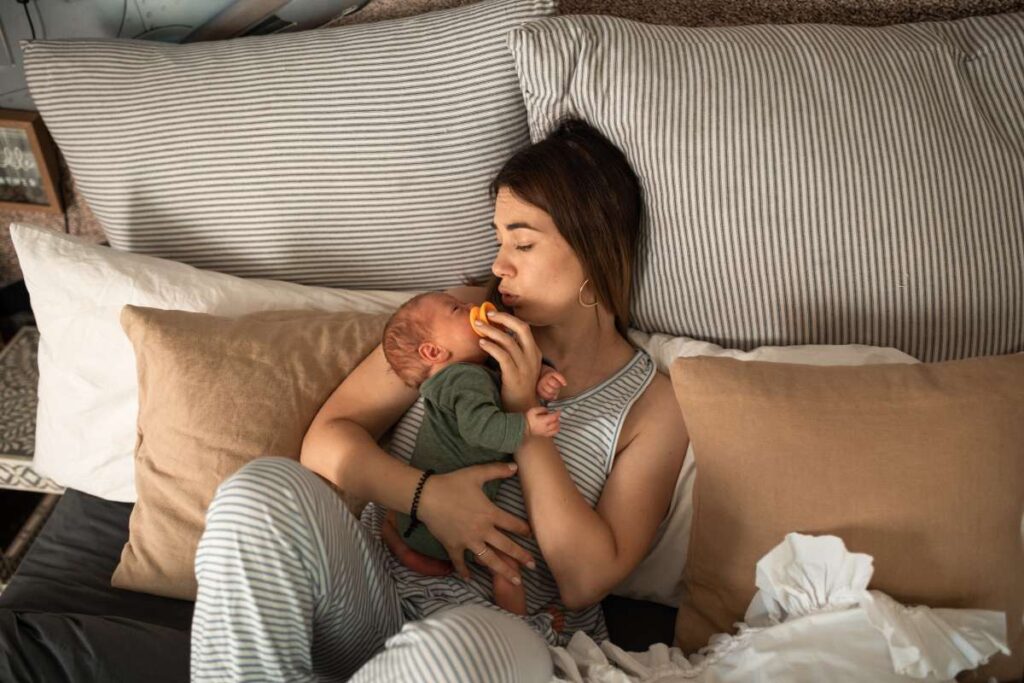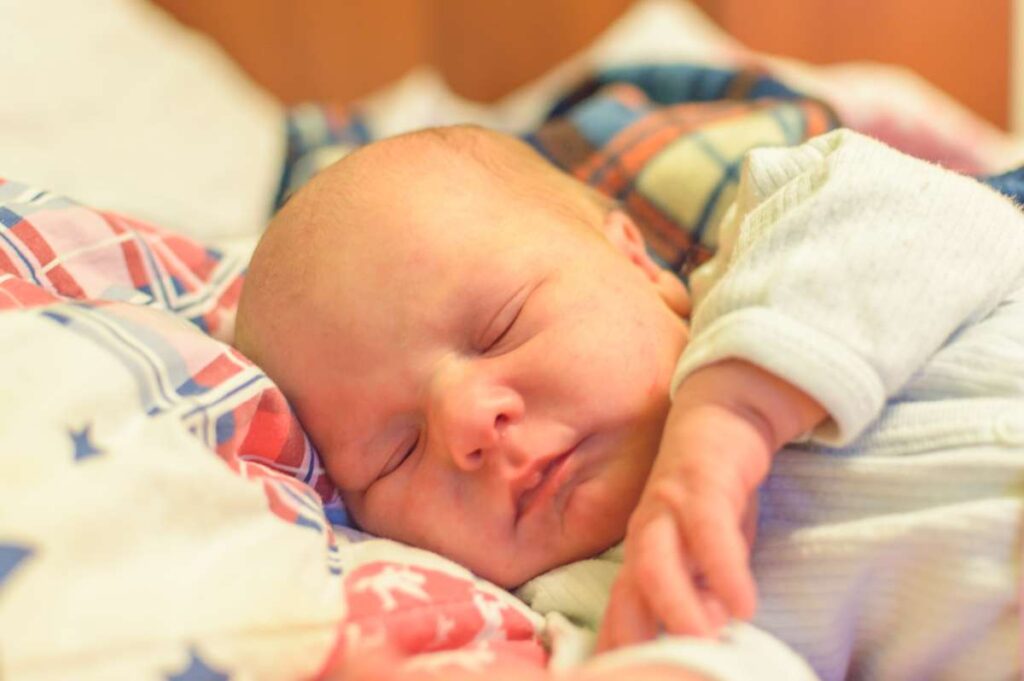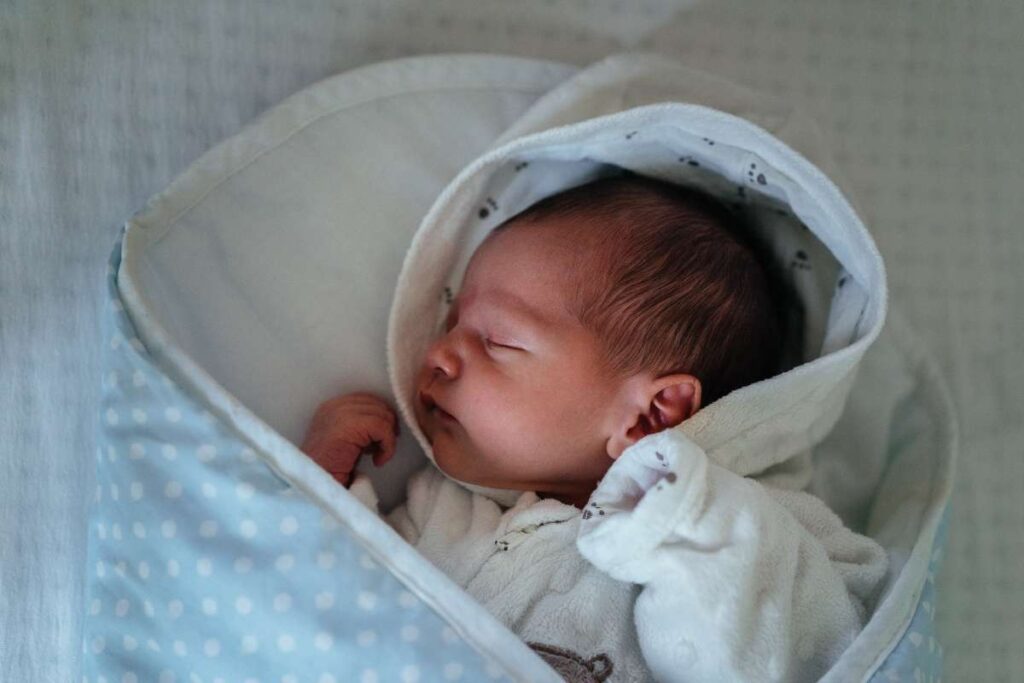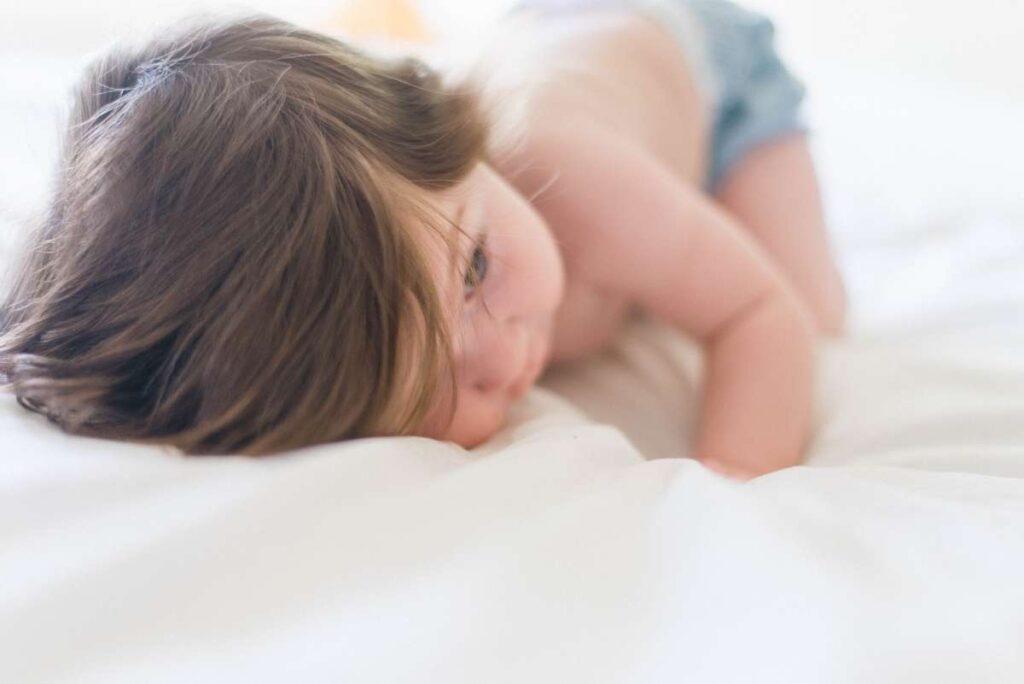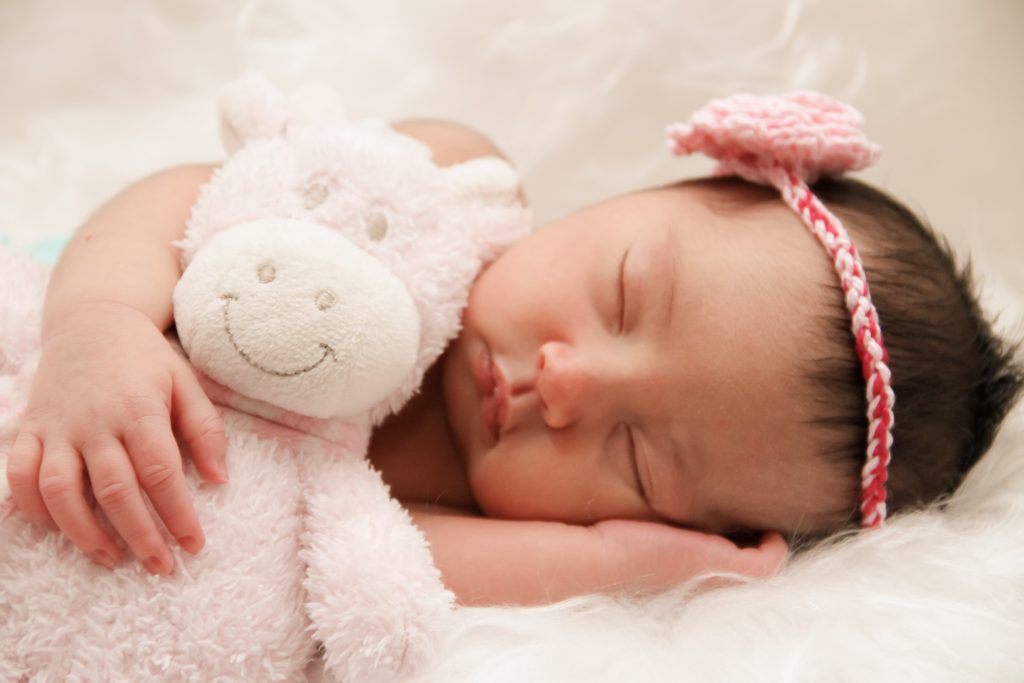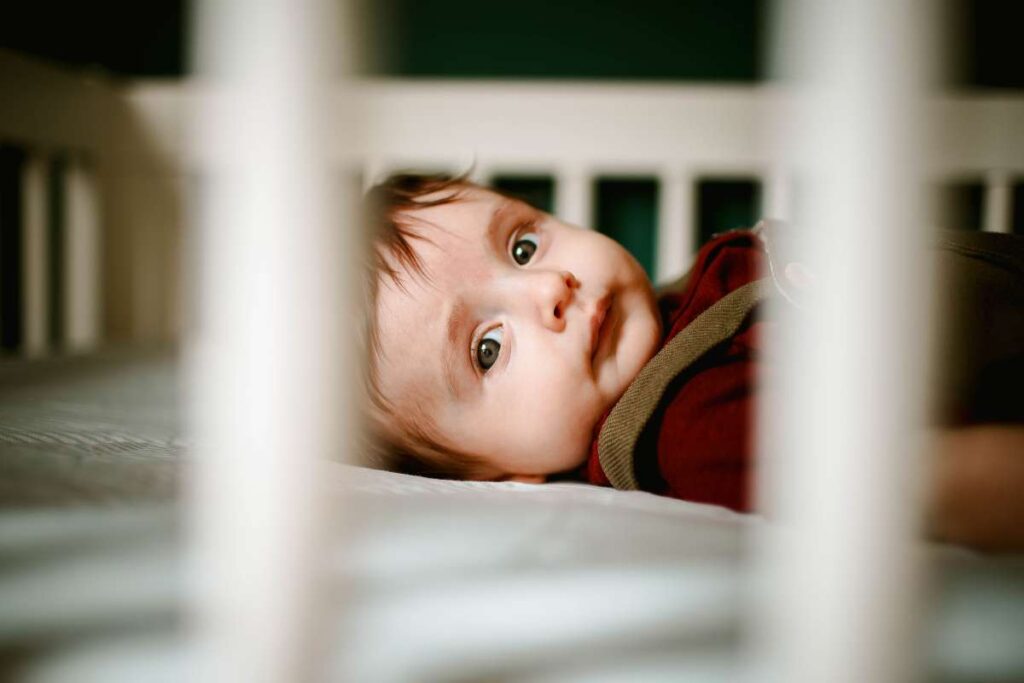Pacifiers can help put fussy babies to sleep at night. You should wait a month to give your nursing baby a pacifier to ensure a smooth transition.
Additionally, the pacifier should never stand in for actual affection. First, see if you can get your baby to sleep by swaddling him or her, rocking him or her, or singing to him. Keep the lights low and the music soft. And during the time he is awake, make sure he receives lots of care (rather than a pacifier).
The use of a pacifier is not without its drawbacks. Some research suggests that using a pacifier before bed can reduce the risk of sudden infant death syndrome (sudden infant death syndrome). On the other hand, pacifier use after six months is associated with an increase in inner ear infections, oral yeast infections, and intestinal infections in infants.
A pacifier may help your baby fall asleep, but it may also cause him to wake up crying if he misplaces it in the middle of the night. It's possible that if this occurs, you'll have to get up multiple times each night to replace the binky.
Another potential risk is that your baby will be in even more discomfort if he or she relies on a pacifier during a cold and subsequently develops a stuffy nose and is unable to breathe normally.
Long-term dental health should be fine as long as your kid gives up the binky by age 5.
Until around the age of 6, your child will only have temporary, or "baby," teeth. But if you let the dentist know that your child uses a pacifier, she can keep an eye out for any issues during routine checkups.
When you become a parent, you have to make a lot of choices and answer a lot of questions that you never even considered before. The fact that your brand-new baby will be affected by these choices makes them feel much more significant.
The abundance of conflicting advice from well-intentioned Facebook friends, books, and parenting experts only serves to further muddy the waters.
The pacifier, or "dummy," is one source of widespread misunderstanding. Babies have an innate desire to suckle. Babies have been seen sucking on one‘s fingers and toes as early as the womb. This means that pacifiers, in one form or another, have been used for thousands of years.
Using a pacifier is just a highly contentious issue. This can cause new parents to be exhausted and confused about how to best care for their child. If you're wondering anything, it could be:
- When is it appropriate to start using a pacifier with my infant?
- I was wondering, what are the benefits and drawbacks of using a pacifier?
- Putting a pacifier in a baby's mouth before bedtime: yes or no?
This piece will evaluate these concerns in depth and provide answers supported by research.
Frequently Asked Questions About Pacifier
American Academy of Pediatrics and Mayo Clinic indicate that pacifiers are safe for your baby to sleep with. Studies have also found a connection between pacifiers and the reduced risk of SIDS.
Yes. It is recommended to introduce a pacifier to a newborn to help reduce the risk of SIDS. Sucking a pacifier may help them fall asleep and stay asleep longer. If the baby is breastfeeding, you may want to establish breastfeeding first.
Sterilise all-new pacifiers. When handwashing, use dishwashing soap that's free of harsh chemicals. Be sure to air dry and squeeze out any remaining water.
Although this can be a challenge, it is important to pay attention to and identify your newborn’s sleep signs. This will allow you to quickly decipher if they are hungry, need to be changed, or are ready for sleep.
Time is of the essence because as your newborn passes their wake time window, they become overtired and agitated. This can drastically affect the quality of sleep your newborn receives.
Pacifiers have a lifespan. They can break down over time, posing a risk to a baby. Before you even notice it, a pacifier can break apart from the nipple and guard, resulting in the baby choking on the separate piece.
When Is It Appropriate To Use A Pacifier?
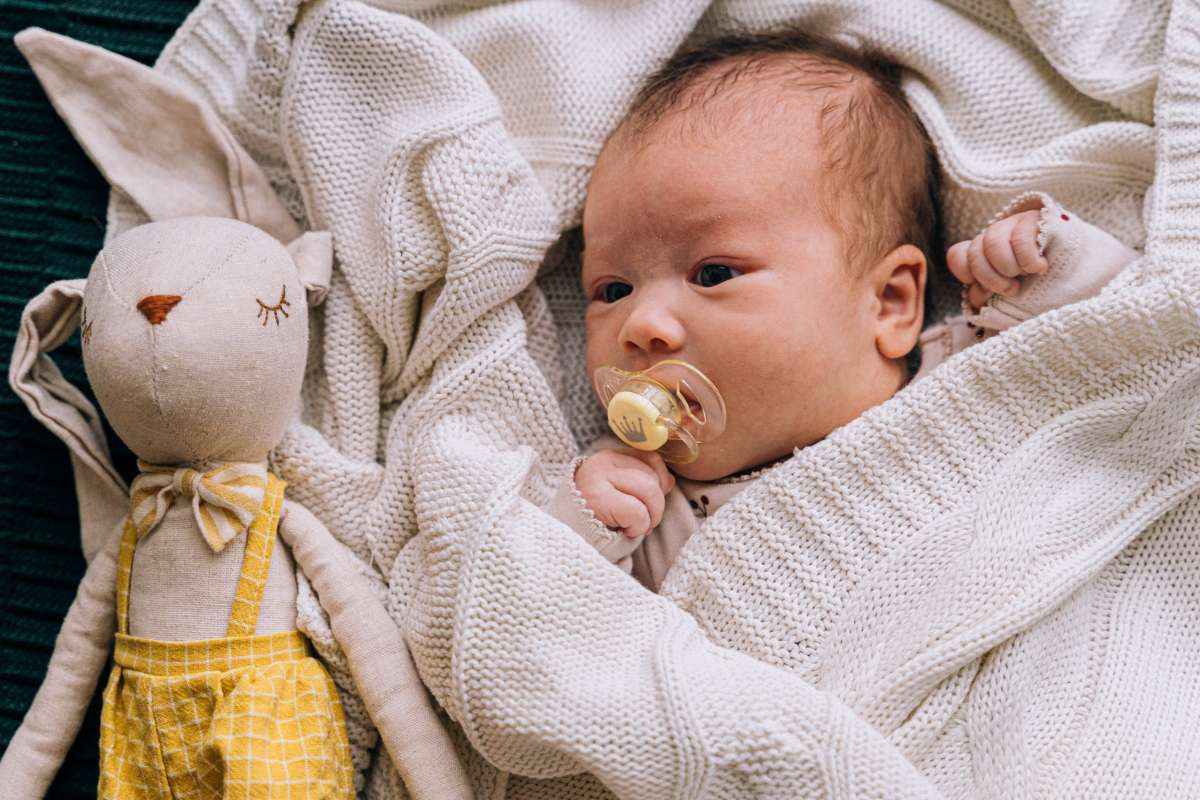
If you're wondering when to give your infant their first pacifier, you're probably concerned that your kid is having problems breastfeeding. When a baby is learning how to feed onto a breast for the first time, the pacifier's form can be very distracting because it looks nothing like a real nipple. This is a problem of muscle memory, nothing more.
This article argues that a baby's sucking motion when using a pacifier is distinct from the motion used to get milk from a breast. One could say the same thing about a bottle. Mothers who plan to breastfeed should discourage their infants from using pacifiers until they have mastered sucking on their mother's breast.
- Newborns who prefer to take their nourishment from a bottle:
- The age at which you first give your child a pacifier is not important.
- The following applies to breastfed infants that have no difficulty establishing a proper latch:
- 3-4 weeks.
- Babies who DO have problems latching when breastfeeding:
- When the baby has been breastfed for 4 weeks or longer.
The most important thing to do is to develop a consistent routine of high-quality nursing before giving your baby a pacifier.
Also, make sure your newborn gets plenty of breast milk.
However, it's also easy to believe that your baby is just upset and needs to be calmed, and to reach for the pacifier instead of feeding him or her.
It's true that the pacifier may help your baby relax, but it's not addressing his primary need: food. Take caution. Introducing a pacifier too soon can lead to a parent neglecting to provide a baby his or her requested amount of breast milk.
Don't forget that pacifiers are meant to calm, not delay or avoid eating.
When Should A Premature Baby Start Using A Pacifier?
Babies born prematurely need to start taking solid foods right away. Among preterm infants, those who were given a pacifier started eating solids sooner than those who weren't. Another intriguing finding from this study was that preterm infants that were exposed to lullaby music began engaging in oral feeding behaviours sooner.
No matter what the results of the preceding study might suggest, you should always discuss the topic of pacifier administration with your baby's paediatrician.
The Benefits And Drawbacks Of Pacifiers
Both the benefits and drawbacks of using a pacifier are easy to see. The choice to use a pacifier is ultimately yours to make. You can use the information in the following list to help you decide.
We were wondering, what are the benefits of employing a pacifier?
- Instead of sucking your thumb, you can do this instead.
- Babies will figure out a method to get their suckles on something. Sucking on a finger or thumb is a bad behaviour that should be discouraged in favor of using a pacifier. If a child continues to gnaw on his or her thumb past the age of two, it may cause dental issues. A pacifier may be taken away far more easily than a thumb!
- A newborn can learn to comfort itself with its help.
- When a newborn learns to fall asleep on his or her own, it's a huge milestone for parents. Using a pacifier can assist your child learn to self-soothe when you are not around.
- Baby pacifiers can be helpful on a flight.
- Have you ever used a powerful yawn to "pop" your ears during takeoff or landing? To the same end, and to further safeguard your infant's sensitive ears during flight and landing, you may want to consider using a pacifier.
- It's a useful tool for calming your infant.
- Babies might be difficult to soothe at times. You've done everything by the book, but your baby still is crying: changed the diaper, fed, and put to bed. If you use a pacifier on your infant, it will help settle him or her down, which will reduce your stress levels.
- A pacifier is one tool for fighting sudden infant death syndrome.
- Pacifier use has been linked to a reduced risk of sudden infant death syndrome in a number of studies (sudden infant death syndrome). While the exact mechanism by which pacifiers protect against sudden infant death syndrome remains unknown, there is substantial evidence to suggest that doing so can help your baby sleep through the night. You, as a parent, can do a few things to lessen your child's risk of sudden infant death syndrome. If you are interested in reading more about how to prevent sudden infant death syndrome, Then have included a link to an additional resource below.
Is there anything negative about pacifiers?
- Breastfeeding is disrupted when a pacifier is used.
- A major criticism of pacifier use is "nipple confusion," which we touched on before. A pacifier can be quite distracting for infants who are still discovering how to breastfeed.
- The use of a pacifier can cause dental problems:
- If your child is still using a pacifier at the age of 24 months, you should know that doing so can lead to the development of crooked teeth.
- Elevated risk of mouth candida due to pacifier use:
- Candida is a normal resident of the human mouth, but excessive growth can cause problems. An increase in the prevalence of this ailment has been linked to the use of dirty pacifiers. Don't forget to sterilise your pacifier if you choose to use one!
- When a child has used a pacifier for a long time as a means of self-soothing, it may be tough to wean them off of it.
- Ear infections are more likely to occur in children who use pacifiers:
- This research suggests that the usage of a pacifier is significantly associated with an increased risk of ear infections. Unless a child consistently develops ear infections, the study's authors say parents don't need to restrict pacifier use.
How To Use A Pacifier To Make Everyone Happy

- If you're going to use a pacifier, make sure it's a one-piece design. In this way, suffocation is prevented to a lesser extent.
- Find pacifiers that are not only safe but created from all-natural rubber and other organic ingredients.
- Don't give your baby a pacifier if it has chemicals like bisphenol-A. (BPA).
- Pacifiers can be sterilised by boiling them for a few minutes in sterile water.
- The occasional pacifier cleaning may even assist your child avoid developing allergies.
Everything Good Must Come To An End.
It may be time you wean your child off the pacifier when he begins to use it as a teether or other type of chewing object. Drooling is a common symptom that your infant is chewing a pacifier instead of sucking on it.
Just as there are several approaches to teaching a child to use the bathroom, there are also various strategies for severing the proverbial umbilical cord between a baby and his or her pacifier. Here are some ideas to try to see what works best for your child:
- cut off access immediately (and brave the tantrums)
- Using a slow and steady method, pacifiers should only be given out at set periods.
- Keep the pacifier in a single location, such as the baby's cot.
- Provide your child with alternative methods of calming themselves, such as their favourite blanket or toy.
The Advantages Of Pacifiers
Pacifiers are equally as useful as baby wipes and are just as essential. You should always have a few on hand to present to your infant, including in your house, vehicle, and purse.
You can rest easy knowing that a pacifier is just less likely to create a habit than thumb sucking is, and that habits seldom arise in infants under six months.
Pacifiers aid in sleep and nap time by doing the following:
- Babies are good at falling and staying asleep.
- If a baby wakes up throughout the night, they can put themselves to sleep again by calming down and soothing themselves.
Baby suckles can also aid in:
- Baby SIDS must be avoided at all costs.
- If you'd like, you can feed your kid only breast milk.
- the length of time your infant goes without crying for food.
Infants can find comfort and distraction using pacifiers:
- in times of general agitation
- caused by a nagging sense of dread
- in times of illness or irritability (heaven forbid, but it happens)
- Whenever they go in for a checkup or vaccinations
- after they've been given a bath but before they jump in
Using a pacifier while flying or travelling can help with:
- reduce stress and worry
- ease discomfort caused by fluctuations in air pressure in the ears
As a new parent, one of the first things you learn is how crucial sleep is to your baby's development.
You also surely know that it's not easy to put your infant or infant to sleep for the night or a nap. Don't worry; Chicco's by your side.
With restful slumber in mind, PhysioForm created their pacifier. Find out how to put your baby to sleep with a pacifier and how to get some shut-eye yourself.
Most medical professionals and scientists agree that putting a newborn or infant to sleep with such a pacifier is safe.
Many parents find that putting their infant to bed with a pacifier helps them get to sleep and stay asleep. You can use a pacifier to help a fussy baby relax and get to sleep, or to help them fall back to sleep after they've been fed.
Ten advantages of pacifiers for infants to use when napping are as follows:
- Newborn and infant pacifier use is associated with a lower incidence of SIDS.
- The use of pacifiers has been shown to aid in the development of critical self-soothing skills for healthy infant sleep and routine patterns.
- The use of a pacifier might aid in putting your baby to sleep or resettling them after waking.
- Babies often cry and can be calmed with a pacifier.
- Babies born prematurely may benefit from using pacifiers since it helps them to sleep and eat, resulting in faster weight gain and
- Babies use pacifiers to satiate their involuntary sucking reflex.
- Studies have indicated that using a pacifier before bedtime or throughout regular sleep rituals can help soothe a fussy baby.
- Your child may find solace in a pacifier through potentially distressing or traumatic experiences, such as vaccination jabs.
- When flying, sucking can assist alleviate pressure in the inner ear and reduce discomfort.
- Unlike a baby's thumb or finger, a pacifier can be thrown away when it's time to stop the habit.
Pacifier Dangers
In spite of their convenience, pacifiers do have certain potential dangers. Too early pacifier use might lead to a condition known as "nipple confusion," which causes the baby to:
- rather nurse on the pacifier than your breast
- wear down and stop breastfeeding for long stretches
They may potentially cause dependency if used regularly for more than six months. Your lovely child faces the risk of:
- develop a reliance on an awake pacifier for comfort
- If the pacifier slips out while sleeping, you will wake up and start crying.
If the pacifier isn't cleaned properly and often, it might spread germs and make the baby sick. They could:
- transmit disease
- aggravate the likelihood of catching an ear infection (more common after the age of 6 months)
Finally, it's well-known that prolonged pacifier use can prevent a baby from developing teeth. They can result in somewhat crooked development of infant teeth.
Manufacturers of baby pacifiers are aware of this problem and have responded by creating products in a variety of sizes and forms. (Before you know it, the tooth fairy will have cleaned out your bank account.)
Conclusion
Wait a month before giving your baby a pacifier to make the transition easier. Pacifiers increase infant ear and mouth yeast infections. No long-term tooth damage should occur if your child stops sucking on a binky by five. Also, a pacifier can distract a baby from learning to latch on to the breast because it doesn't feel or look like a nipple. If parents introduce pacifiers too early, they may not give their babies enough breast milk.
Pacifiers have pros and cons. Avoid bad behaviours like thumb-sucking. Pacifiers prevent SIDS. Research shows that pacifiers help babies sleep through the night. Pacifiers distract newborns from learning to nurse.
Pacifiers increase ear infections in children. Several methods can break a baby's pacifier attachment. Pacifiers are essential, like baby wipes. Always have a supply for your child. Pacifiers can help babies fall and stay asleep.
Pacifiers can quite fussy babies before bedtime or through other sleep practices. However, if you use a pacifier too early, your baby may develop "nipple confusion" and prefer the pacifier to a nurse. In addition, they can cause addiction after six months of use.
Content Summary
- Pacifiers can help put fussy babies to sleep at night.
- You should wait a month to give your nursing baby a pacifier to ensure a smooth transition.
- First, see if you can get your baby to sleep by swaddling them, rocking them, or singing to him.
- But if you let the dentist know that your child uses a pacifier, she can check for any issues during routine checkups.
- The pacifier, or "dummy," is one source of widespread misunderstanding.
- This piece will evaluate these concerns in depth and provide research-supported answers.
- If you're wondering when to give your infant their first pacifier, you're probably concerned that your kid is having problems breastfeeding.
- This article argues that a baby's sucking motion when using a pacifier is distinct from the motion used to get milk from a breast.
- Mothers who plan to breastfeed should discourage their infants from using pacifiers until they have mastered sucking on their mother's breasts.
- The most important thing to do is to develop a consistent routine of high-quality nursing before giving your baby a pacifier.
- Also, make sure your newborn gets plenty of breast milk.
- No matter what the results of the preceding study might suggest, you should always discuss the topic of pacifier administration with your baby's paediatrician.
- Both the benefits and drawbacks of using a pacifier are easy to see.
- The choice to use a pacifier is ultimately yours to make.
- Using a pacifier can assist your child in learning to self-soothe when you are not around.
- It's a useful tool for calming your infant.
- If you use a pacifier on your infant, it will help settle them down, which will reduce your stress levels.
- A pacifier is one tool for fighting sudden infant death syndrome.
- Pacifier use has been linked to a reduced risk of sudden infant death syndrome in some studies (sudden infant death syndrome).
- A major criticism of pacifier use is "nipple confusion," which we discussed before.
- The use of a pacifier can cause dental problems: If your child is still using a pacifier at the age of 24 months, you should know that doing so can lead to the development of crooked teeth.
- Remember to sterilise your pacifier if you choose to use one!
- Ear infections are more likely to occur in children who use pacifiers: This research suggests that using a pacifier is significantly associated with an increased risk of ear infections.
- Don't give your baby a pacifier if it has chemicals like bisphenol-A. (BPA).
- Drooling is a common symptom when your infant cheats a pacifier instead of sucking on it.
- Just as there are several approaches to teaching a child to use the bathroom, there are also various strategies for severing the proverbial umbilical cord between a baby and their pacifier.
- Pacifiers are equally as useful as baby wipes and are just as essential.
- Pacifiers aid sleep and nap time by doing the following: Babies are good at falling and staying asleep.
- You also know it takes work to put your infant or infant to sleep for the night or a nap.
- Find out how to put your baby to sleep with a pacifier and get some shut-eye yourself.
- Many parents find that putting their infant to bed with a pacifier helps them get to sleep and stay asleep.
- Ten advantages of pacifiers for infants to use when napping is as follows: Newborn and infant pacifier use is associated with a lower incidence of SIDS.
- Babies often cry and can be calmed with a pacifier.
- Studies have indicated that using a pacifier before bedtime or throughout regular sleep rituals can help soothe a fussy baby.
- Unlike a baby's thumb or finger, a pacifier can be thrown away when it's time to stop the habit.
- Despite their convenience, pacifiers do have certain potential dangers.
- If the pacifier isn't cleaned properly and often, it might spread germs and make the baby sick.
- They could: transmit disease and aggravate the likelihood of catching an ear infection (more common after six months). Finally, it's well-known that prolonged pacifier use can prevent a baby from developing teeth.
